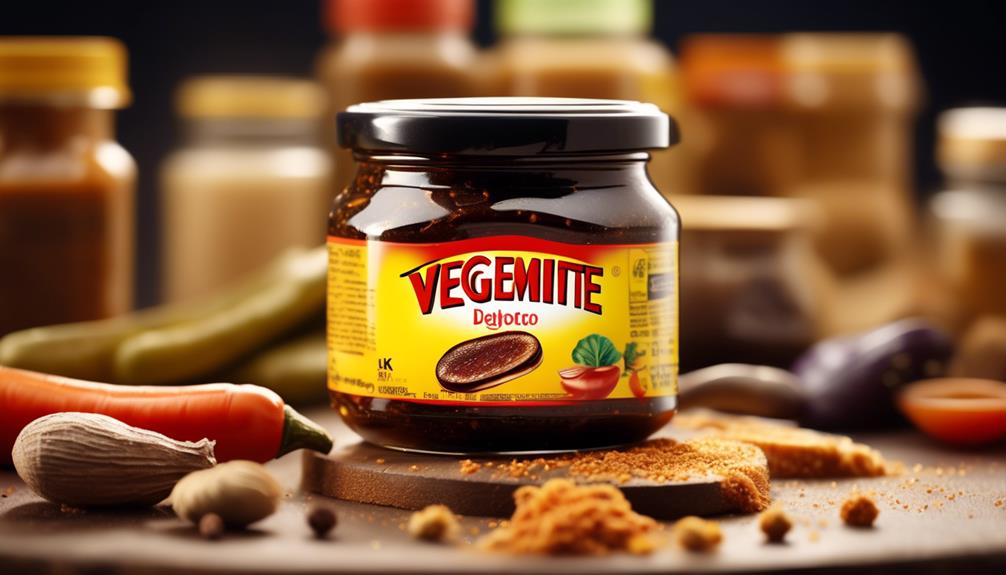Imagine standing at a crossroads, one path leading to the familiar and comforting, the other to the necessary and nourishing.
You find yourself inexplicably drawn towards the latter, craving Vegemite in a way that seems almost primal.
You might wonder why your body is signaling for this savory spread, often polarizing in its reception.
Is it merely a taste acquired from your childhood, or is there a deeper nutritional calling your body is trying to communicate?
Vegemite, rich in B vitamins, might be your body’s way of seeking out essential nutrients for brain health and energy levels.
This unexpected yearning could also be a complex interplay of psychological factors, cultural influences, and perhaps, a unique taste profile that your palate now seeks.
Key Takeaways
- Vegemite is rich in B vitamins, which are essential for brain health, nerve function, and heart health.
- Cravings can be influenced by psychological triggers and emotional eating habits.
- Vegemite has a unique taste profile with high umami compounds, creating a polarizing taste.
- Cultural influences play a significant role in food choices, with Vegemite having cultural significance and cravings tied to cultural identity.
Nutritional Needs and Vegemite
Vegemite can significantly meet your daily nutritional needs, especially for B vitamins, with just a teaspoon offering up to 50% of the recommended intake.
This low-calorie, protein-rich spread isn’t just a staple in Australian homes for its taste; it’s also a powerhouse of essential nutrients.
The B vitamins in Vegemite, including thiamin, riboflavin, niacin, and folate, play crucial roles in maintaining your health.
They’re vital for brain health, supporting nerve function, and ensuring your heart stays healthy.
These nutrients have been linked to reducing the risk of several health issues. For instance, adequate intake of the B vitamins found in Vegemite can help prevent neural tube birth defects, making it an excellent source of vitamins B for expectant mothers.
If you’re someone who suffers from migraines, incorporating Vegemite into your diet might reduce the frequency of these debilitating headaches.
Plus, the niacin present in Vegemite can aid in lowering bad LDL cholesterol levels, contributing to improved heart health.
However, it’s important to balance your love for Vegemite with awareness of its high sodium content.
While it’s a beneficial source of vitamins B, consuming it in moderation is key, especially if you have specific health conditions or need to watch your sodium intake.
Psychological Factors Behind Cravings
Understanding the psychological factors behind cravings can help you navigate your dietary choices more effectively, steering clear of unhealthy patterns.
When you’re suddenly hit with a craving for Vegemite, it’s not just your taste buds talking.
Your brain is often steering the ship, influenced by a mix of psychological triggers.
The urge to indulge in specific foods like Vegemite can stem from a desire to:
- Regulate mood by triggering a release of dopamine or serotonin, the ‘feel-good’ neurotransmitters, which provide a quick emotional uplift.
- Reduce anxiety through the comfort of familiar, often nostalgia-linked flavors that offer a soothing escape from stress.
- Satisfy emotional eating habits, where you turn to food for comfort, stress relief, or as a reward, rather than out of hunger.
- Repeat learned behavior, echoing patterns established in childhood or during other formative periods, where certain foods became associated with positive feelings or rewards.
These psychological factors behind cravings are powerful influencers. They can make you reach for that jar of Vegemite without fully understanding why.
Recognizing these triggers can empower you to make choices that better align with your health goals.
Instead of giving in to a craving out of habit, you might find healthier ways to regulate your mood or reduce anxiety.
Vegemite’s Unique Taste Profile

Recognizing why you crave certain foods, such as the complex flavors of Vegemite, can also lead you to appreciate its unique taste profile.
Vegemite’s distinctive flavor comes from its high concentration of umami compounds, making it a fascinating subject for your taste buds.
This brewers yeast spread offers a salty, savory, and slightly bitter taste that’s unlike anything else.
Its intense flavor, described as meaty, yeasty, and earthy, showcases a strong umami presence that can be both intriguing and challenging.
The combination of saltiness, bitterness, and umami in Vegemite creates a polarizing taste profile.
It’s this mix that may initially overwhelm you, yet over time, it’s also what can lead to a strong craving for this unique spread.
The umami-rich character of Vegemite, thanks to the yeast extract and vegetable additives, contributes to its distinct, concentrated flavor.
This complexity is what draws you in, making you crave its rich umami and salty notes.

Cultural Influences on Food Choices
Delving into the realm of cultural traditions, it’s clear how deeply our food preferences and choices are shaped by the societies we grow up in.
You might be craving Vegemite because of the cultural influences on food choices that have subtly guided your palate from an early age.
Whether you’re from New Zealand or another part of the world where Vegemite has made its mark, these influences can be profound.
Cultural traditions and beliefs, availability of certain foods, social gatherings, and religious or ethical beliefs are all factors that shape what and how we eat.
Think about the Vegemite taste that’s so distinctive and how it ties back to these aspects:
- The cultural significance of Vegemite as a staple in breakfasts and snacks, making it a comforting reminder of home for many.
- Social events in New Zealand and Australia, where Vegemite on toast is a common treat, reinforcing its place in your dietary preferences.
- Availability of Vegemite in these regions, ensuring it’s a go-to choice for many seeking a savory spread.
- Migration and globalization, which have introduced Vegemite to new audiences, expanding its cultural footprint and perhaps influencing your own cravings.
These elements highlight how cultural influences on food choices aren’t just about the physical act of eating but also about the emotional and social experiences tied to food.
Your craving for Vegemite isn’t just about the taste; it’s a reflection of cultural identity, memories, and possibly even a sense of belonging.
Managing and Understanding Cravings

To effectively manage cravings, it’s vital to first identify what triggers them.
This could be nutritional deficiencies, hormonal changes, or emotional states.
If you’re craving Vegemite, it might be more than just a taste preference. It could signal a need for vitamin B, which Vegemite is rich in.
Nutrient deficiencies play a significant role in cravings. For instance, a longing for chocolate could indicate a magnesium shortage, while sugar cravings often point to an iron deficiency or a need for serotonin, a mood regulator.
Similarly, Vegemite cravings might suggest your body is seeking the B vitamins it contains, essential for energy production and neurological health.
Hormonal fluctuations, particularly in women before menstruation, can alter blood sugar levels and serotonin, leading to increased sugar cravings.
Balancing these through diet can help manage these urges.
Furthermore, emotional triggers, like stress or depression, can drive you towards comfort foods, often high in sugar, fat, or carbs.
Recognizing these emotional states and finding healthier coping mechanisms can diminish these cravings.
A balanced diet, inclusive of adequate protein, healthy fats, and complex carbohydrates, is crucial.
It helps stabilize blood sugar levels, reducing cravings and providing essential nutrients.
Including prebiotic and probiotic-rich foods supports gut health, potentially decreasing the urge for specific foods by promoting a balanced microbiome.

Conclusion
So, you’re craving Vegemite? It’s likely your body signaling for those essential B vitamins, or maybe it’s just your taste buds reminiscing.
Psychological factors, like stress reduction, or simply growing up with it might be at play too.
Vegemite’s unique flavor has a way of making a lasting impression, culturally ingrained or not.
Understanding these cravings can help manage them better. Remember, indulging in a bit of Vegemite isn’t just satisfying; it could be beneficial too.